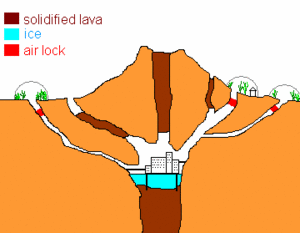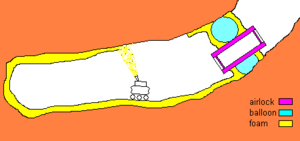Difference between revisions of "Volcanic cave settlement"
m (restoring multiple deletions, removing garbage) |
|||
| Line 6: | Line 6: | ||
The concept utilizes lava caves for shelter. Compared to other settlement types the cave settlement provides the biggest [[habitat]] space with respect to the [[Transport from Earth to Mars|transported]] construction material. | The concept utilizes lava caves for shelter. Compared to other settlement types the cave settlement provides the biggest [[habitat]] space with respect to the [[Transport from Earth to Mars|transported]] construction material. | ||
| − | + | ==Unmanned preparation of settlement room in a natural cave== | |
| + | [[Image:AutomatedNaturalCaveArrangement.png|thumb|left|300px|Automated construction of a habitat using a natural cave]] | ||
| + | |||
| + | First the cave is tested for stability with a series of small detonations, forcing loose rocks to fall down. The cave might be shaped a little to remove some prominent noses and to create an even ground. | ||
| + | |||
| + | The entrance is then sealed. The shape of the seal is temporarily supported by means of a balloon, which is sprayed with several layers of [[polyurethane]] [[foam]] and [[fiberglass]]. A pre-processed [[airlock]] is integrated with the balloon. | ||
| + | [[Image:Cave_Room.PNG|thumb|right|px|Cross section of a [[lava tube]]]] | ||
| + | A layer of polyurethane foam is also sprayed upon the entire inner surface of the cave, providing an [[air]]-tight and thermal [[insulation|insulating]] skin. | ||
| + | |||
| + | The preparation of a natural cave is simple and can be easily remote controlled. It offers the best protection against [[radiation]] and [[meteorites]] and is, therefore, considered to be part of the [[unmanned setup of a whole settlement]]. | ||
| + | |||
| + | There may be dangers associated with creating a habitat in a cave, such as the cave collapsing due to ground quakes, poison gases that seep through the walls, and possible contamination of any native life. | ||
| + | |||
| + | ==See also== | ||
| + | *[[Artificial cave]] | ||
| + | |||
| + | {{SettlementIndex}} | ||
| + | |||
| + | [[Category:Settlements]] | ||
| + | [[Category:Concepts]] | ||
Revision as of 10:20, 23 May 2011
|
v · d · eSettlement Types | ||||
|---|---|---|---|---|
Overview
The Volcanic Cave Settlement concept is based upon the discovery of caves in the surface of Mars near an extinct volcano, Arsia Mons.
The concept utilizes lava caves for shelter. Compared to other settlement types the cave settlement provides the biggest habitat space with respect to the transported construction material.
Unmanned preparation of settlement room in a natural cave
First the cave is tested for stability with a series of small detonations, forcing loose rocks to fall down. The cave might be shaped a little to remove some prominent noses and to create an even ground.
The entrance is then sealed. The shape of the seal is temporarily supported by means of a balloon, which is sprayed with several layers of polyurethane foam and fiberglass. A pre-processed airlock is integrated with the balloon.

A layer of polyurethane foam is also sprayed upon the entire inner surface of the cave, providing an air-tight and thermal insulating skin.
The preparation of a natural cave is simple and can be easily remote controlled. It offers the best protection against radiation and meteorites and is, therefore, considered to be part of the unmanned setup of a whole settlement.
There may be dangers associated with creating a habitat in a cave, such as the cave collapsing due to ground quakes, poison gases that seep through the walls, and possible contamination of any native life.
See also
| Concepts: | Greenhouse · Settlements · Locations · General |
| Hazards: | Space Weather · Climate · General |
| Technology: | Hi-Tech · Lo-Tech · Energy · Spaceflight science · Communication · General |
| Human Considerations: | Economics · Health · Governance · Trade · Law · Social |








